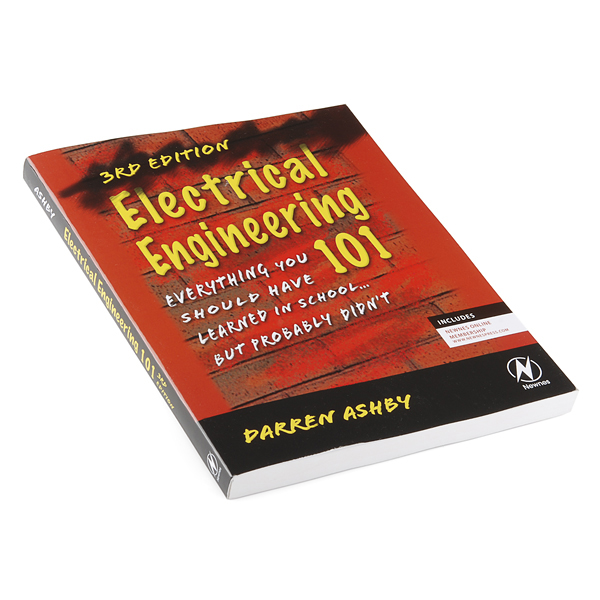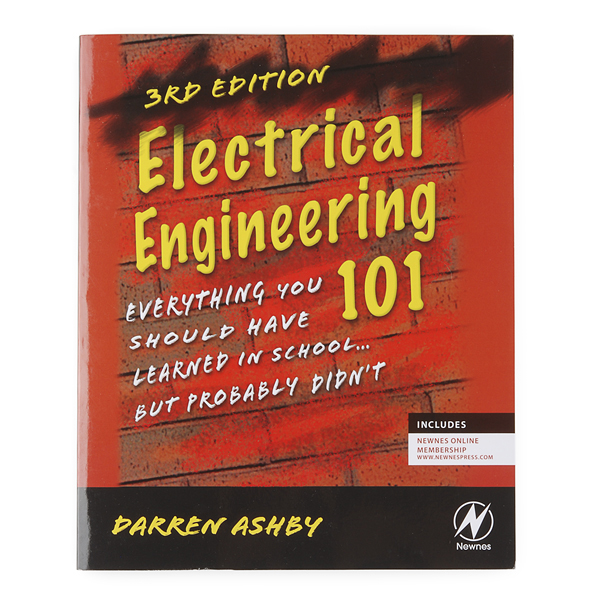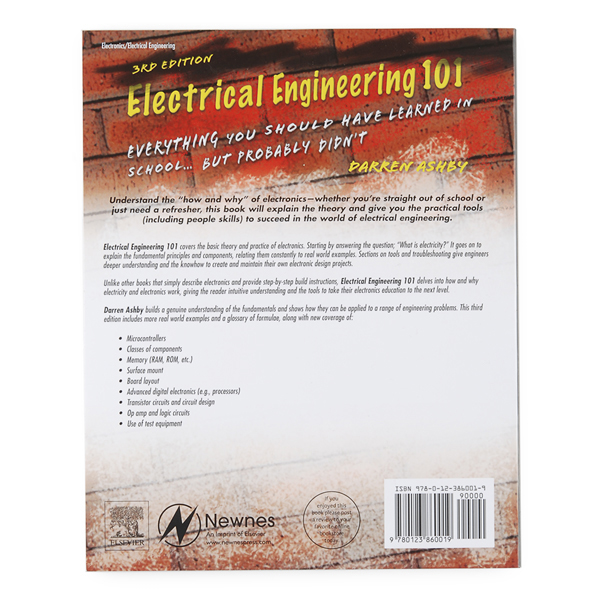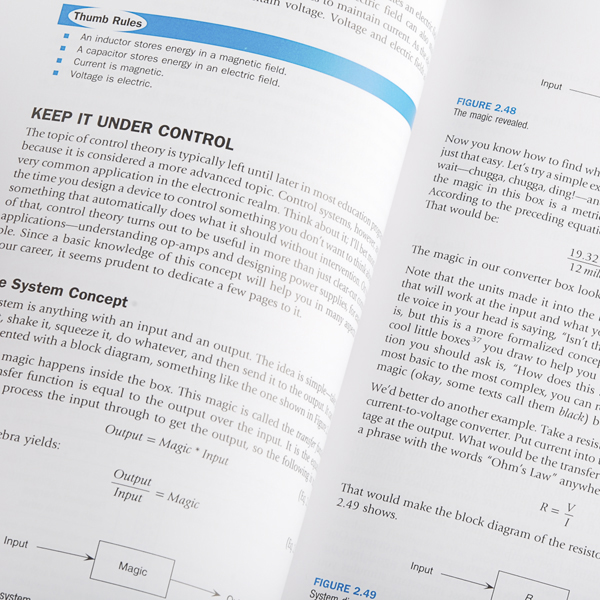Electrical Engineering 101 - (3rd Edition)
Everything you should have learned in school, but probably didn't! This book is great for electronics newbies, or if you just need a refresher course. Topics ranging from Ohm's law to proper usage of an oscilloscope to managing and interacting with employees are covered.
The book approaches all of its topics in a very straight-forward, practical manner, and all the important information is summed up nicely in a "Rules-of-Thumb" section. The information presented in this book will provide a great start towards building or reinforcing your EE knowledge.
We're carrying this book because the author (Darren Ashby) thinks and writes like we do. He has a large disclaimer in the front of the book, but points out that electronics can be taught to anyone with the right approach. We agree.
A few of the topics covered:
- What is electricity really?
- Ohm's Law
- Capacitors and Inductors
- Op-Amps
- Microprocessor Basics
- Motors
- Power Supplies
- Tools (soldering irons, oscilloscopes, etc.)
- Troubleshooting
- Communication Skills
Info:
- Author: Darren Ashby
- Publisher: Newnes
- Paperback: 320 pages
- 3rd Edition
- ISBN-10: 0123860016
- ISBN-13: 978-0123860019
Electrical Engineering 101 - (3rd Edition) Product Help and Resources
Core Skill: Programming
If a board needs code or communicates somehow, you're going to need to know how to program or interface with it. The programming skill is all about communication and code.
Skill Level: Noob - Programming will be limited to basic drag and drop interfaces like ModKit or Scratch. You won't be writing code, but you will still need to understand some basics of interfacing with hardware. If you?re just using a sensor, it's output is analog.
See all skill levels
Core Skill: Electrical Prototyping
If it requires power, you need to know how much, what all the pins do, and how to hook it up. You may need to reference datasheets, schematics, and know the ins and outs of electronics.
Skill Level: Noob - You don't need to reference a datasheet, but you will need to know basic power requirements.
See all skill levels
Comments
Looking for answers to technical questions?
We welcome your comments and suggestions below. However, if you are looking for solutions to technical questions please see our Technical Assistance page.
Customer Reviews
5 out of 5
Based on 1 ratings:
Groundbreaking for wannabee electrical engineer
I studied the life sciences in college. In my career now, how I regret not going down the path of electrical engineering. Darren Ashby lays it out in terms that are technical yet easy to grasp. It will take a while, but I know this is the solid foundation for me to get started.





i like how this item is RoHS compliant.
We specifically requested the lead free version of the book from our distributors.
Lead used to be used in newspaper inks...
This is a GREAT book! I'm an electrical engineer and I switched jobs a few months back that involved more analog and basic electronics than what I had been doing (high speed digital design). I picked up this book and I have re-learned so much from it. It's an easy read and Ashby does a great job explaining the basic electronic components including op-amps and transistors. He does it in an easy-to-read and easy-to-remember way. Even if you feel you have a good grasp of the concepts, Ashby puts it all together in a way to help with reading a schematic and intuiting what it does without having to break out the SPICE simulator.
I did get tired of all of Ashby's initial comments about how certain concepts are not taught in college, like unit math. I had unit math drilled into me as well as several of the other concepts he complains are not covered. It had me initially questioning what his education background was. However, IMHO, simply ignore those comments and the rest of the book will be great.
This is a great book. I'm a sophomore in EE, and I read this book and it made me look like a genius in front of my profs and fellow students so much so that I have seniors asking for my help with their senior design projects. I highly recommend this book and actually getting your hands dirty with prototyping.
Sure, you COULD go to some web giant and buy it cheaper. But why would you take your business elsewhere? Why not support the great guys @ sparkfun?
I'll be picking one up for my friend in engineering as an Xmas gift (and one copy for my self). :)
How about some very practical reasons to order somewhere else:
Retirement
Social security
Student
In other words people with fixed or inadequate earnings.
Fourteen dollars could be the catalyst to even buy the book at all. I support the guys at Sparkfun by buying from them. However, for this book I will go to Amazon since I am retired on a fixed income and can use the extra $14.00.
I really enjoyed this book. As a software and electronics enthusiast, I found the info relevant and helpful. Such as calculating turn-on current for bi-polar transistors and 16-bit division in assembler code. It's a great book all around.
Please consider retiring/replacing this item as the third edition has been released. It corrects the majority of errata that will confuse you for hours.
Hi! We are carrying the 3rd edition at the moment. We order in small batches, so we get the latest edition. Thanks for your feedback! :)
Great book. Bought it off amazon but if i had known sparkfun stocked it i would of bought here just to support the website/company. Currently using it for revision for my end of semester exam. I see it as a tool and have used it throughout my first year of college and use it at home for my home projects.
IMO ,Horowitz and Hill, the Art of Electronics is a much much more in depth read. Ashby's book is designed to give the newb engineer some insight on what they should be focusing on fundamentally especially if they want to have a successful career as an engineer, and not as a paper pusher.
How does it compare to Horowitz and Hill?
30$ on Amazon ! :$